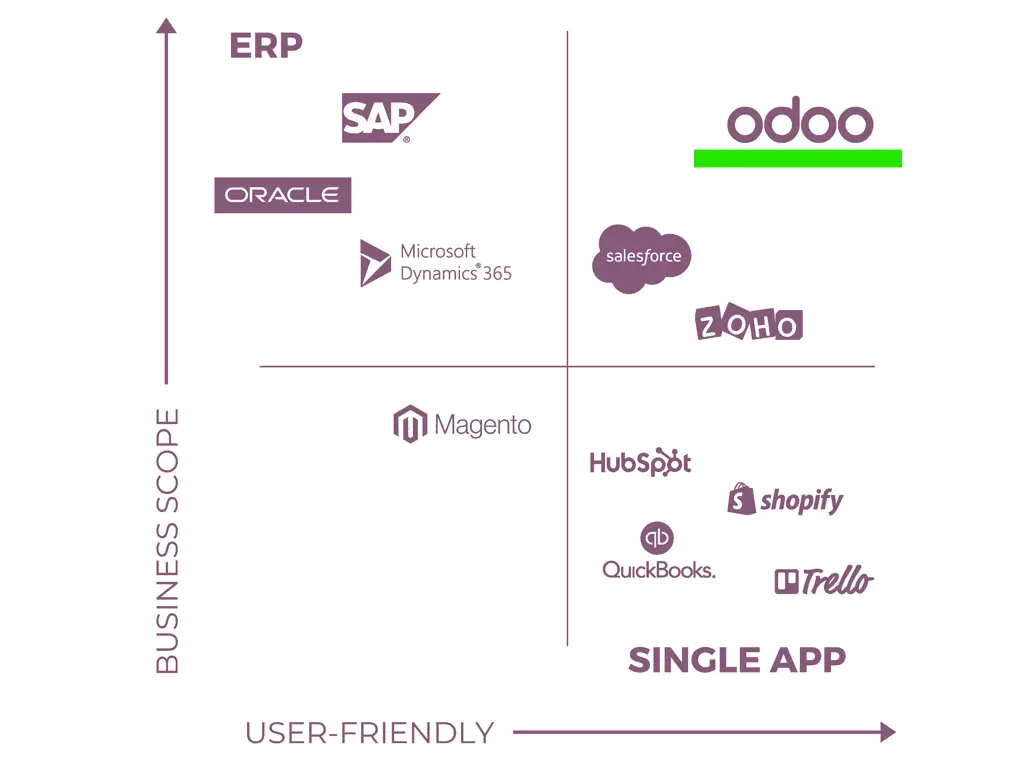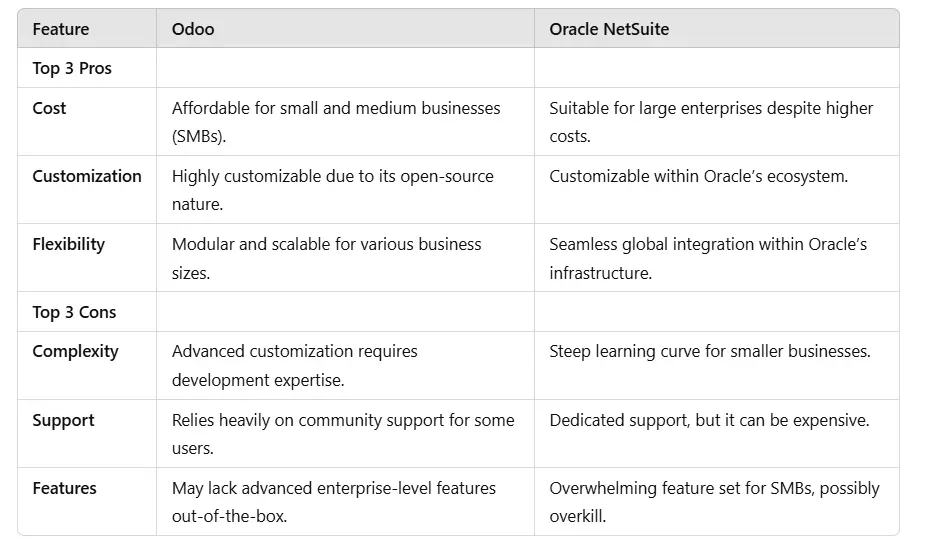Choosing an Enterprise Resource Planning (ERP) system is like picking the foundation for your business skyscraper. A solid choice can support growth and efficiency, while a poor one can crumble under pressure. In a market dominated by big players like SAP, Oracle, and Microsoft Dynamics, Odoo often stands out as the scrappy, open-source contender. But is it the right choice for you? Let's dive into a fair and balanced comparison, highlighting both the strengths and weaknesses of Odoo against its established rivals.
1: Odoo vs. SAP: The Customization King vs. the Enterprise Titan
- Odoo:
- Strengths: Unmatched Customization: Odoo's modularity and open-source nature allow for unparalleled customization. You only pay for what you need, and developers can tailor the system to fit your exact requirements. Cost-Effective: Generally lower upfront costs and licensing fees compared to SAP. Ease of Use: A modern, intuitive interface that's easier for smaller teams to adopt quickly.
- Weaknesses: Scalability for Massive Enterprises: While Odoo scales well, it might require more custom development and infrastructure to handle the sheer volume of transactions and users that a multinational corporation running SAP would experience. Smaller Ecosystem of Certified Consultants: Compared to SAP's massive network.
- SAP:
- Strengths: Proven Track Record: SAP has been the enterprise ERP leader for decades. Comprehensive Functionality: Covers a vast range of business processes, often "out-of-the-box." Extensive Support Network: A huge ecosystem of consultants and partners worldwide.
- Weaknesses: High Cost: Significant upfront investment and ongoing maintenance fees. Complexity: Can be complex to implement and customize, requiring specialized expertise. Less Agile: Less flexible than Odoo when it comes to quickly adapting to changing business needs.
Creative Angle: Think of SAP as a fully-equipped battleship – powerful and reliable, but hard to maneuver. Odoo is more like a nimble speedboat – agile, customizable, and ready to adapt to any mission.
2: Odoo vs. Microsoft Dynamics 365: The All-In-One Suite vs. the Cloud-First Competitor
- Odoo:
- Strengths: Integrated App Ecosystem: Odoo's "app store" approach provides a wide range of integrated modules, from CRM and e-commerce to manufacturing and project management. Open-Source Flexibility: Greater control over your data and the ability to customize the system without vendor lock-in. Growing Community: A vibrant and active community contributing to new modules and improvements.
- Weaknesses: Integration with Existing Microsoft Infrastructure: Less seamless integration with other Microsoft products (e.g., Office 365) compared to Dynamics. Reliance on Community Modules: Quality and support for community-developed modules can vary.
- Microsoft Dynamics 365:
- Strengths: Seamless Microsoft Integration: Native integration with other Microsoft products, such as Office 365, Power BI, and Azure. Cloud-First Approach: Designed for the cloud, making it easy to deploy and scale. Strong Focus on CRM: Excellent CRM capabilities are tightly integrated.
- Weaknesses: Licensing Complexity: Licensing can be complex and expensive, especially as you add more users and modules. Less Customization: Limited customization options compared to Odoo's open-source approach.
New Perspective: Dynamics 365 is like a perfectly coordinated marching band, with everything working together harmoniously within the Microsoft ecosystem. Odoo is like a jazz ensemble, allowing for more improvisation and individual expression.
3: Odoo vs. Oracle NetSuite: The Disruptor vs. the Cloud ERP Veteran
- Odoo:
- Strengths: Modular Pricing: Pay only for the modules you need, making it a more affordable option for smaller businesses or those with specific requirements. Modern User Interface: A clean, intuitive interface that's easy to learn and use. Rapid Implementation: Can be implemented more quickly than NetSuite.
- Weaknesses: Smaller Market Share: A smaller market share than NetSuite, which may translate to fewer industry-specific solutions and fewer experienced consultants. Limited Enterprise Features Out-of-the-Box: Some advanced enterprise features may require custom development or third-party modules.
- Oracle NetSuite:
- Strengths: Comprehensive Cloud ERP: A full-featured cloud ERP suite with strong capabilities in finance, accounting, CRM, and e-commerce. Mature Platform: A well-established and reliable platform with a large customer base. Industry-Specific Solutions: A wide range of industry-specific solutions tailored to different verticals.
- Weaknesses: High Cost: A relatively expensive option, especially for small and medium-sized businesses. Less Flexible: Less flexible than Odoo when it comes to customization and adapting to unique business requirements.
Objective Analogy: NetSuite is like a luxury Swiss Army knife – it has every tool you could possibly need, but it comes at a premium price. Odoo is like a versatile multi-tool – you can add the attachments you need as you go, making it a more budget-friendly and customizable option.
Conclusion: Finding the Right Fit for Your Business
There's no "one-size-fits-all" ERP solution. The best choice for your business depends on your specific needs, budget, and technical capabilities.
- Choose Odoo if: You need a highly customizable, cost-effective solution with a modern interface and an integrated app ecosystem.
- Choose SAP if: You need a proven, comprehensive ERP system for a large enterprise with complex requirements.
- Choose Dynamics 365 if: You're heavily invested in the Microsoft ecosystem and need a cloud-first solution with strong CRM capabilities.
- Choose NetSuite if: You need a full-featured cloud ERP suite with robust finance, accounting, and CRM features.
Still unsure which ERP system is right for you? Contact us for a free consultation and let our experts help you find the perfect fit.

